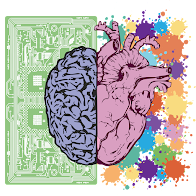Alongside
writing, one of my Other Jobs is working for a neuroscience charity. Useful,
because I’ve long had a fascination with how our brains construct our sense of self and its (not always helpful) effect on storytelling. So, I thought I might just share
some of the things I’ve learnt along the way. . .
Models and pathways
While the act of imagining might feel creative, it’s actually a science.
Our brains engage with the world via the information it
receives by our senses (think ‘Inside Out’). Through this sensory information, it
creates a model of how we need to operate and survive. For example: You touch a
boiling pan. Ow, pain sends a signal to the brain. Brain’s model: Never
touch a boiling pan.
When we craft and write a story, we actually navigate those tried and tested pathways that are set
for survival (don’t touch the boiling pan). Our creativity comes from how our brain makes sense of life. Visual
perception, neural connections, neuro pathways: they’re all actively involved
in our storytelling.
The plastic brain
Yet
– hurrah (for me anyway!) – as writers, we don’t need to be held hostage by any fixed model from our individual experiences. Thankfully, neuroplasticity – the brain’s ability to keep changing – means we can keep creating new pathways, making new connections and remapping our models
of behaviour. We can change.
By becoming more aware of our individual brain ‘model’, we can also
develop our storytelling skills. This is an area that Will Storr explores in
much more depth in his book, ‘The Science of Storytelling’. Storr examines how understanding our own brain’s construction of a story can lead to a far deeper engagement with our audience.
How to write what you don’t know
Disclaimer: I’m no neuroscientist, but I’ve drawn on
my other side hustle, as a relationship counsellor, to come up with some self-analysis
l regularly employ to ensure I stay mindful of my brain’s current working model. These include:
🧠 Challenge your choices. Are my characters’ choices
influenced by my own experiences?
🧠 Write what scares you. Am I avoiding certain themes or life experiences in my writing?
🧠 Recognise your barriers. Do I return to similar themes or repeat the same ideas?
🧠 Keep your baggage in your toolbox. Am I using my
experiences to enhance my writing or are my life experiences taking over?
Sail that ship
While, yep, working in the world of neuroscience has made me realise just how much I'm at the mercy of that complicated jelly organ inside my skull, it can also be liberating. I like to remind myself I’m at the helm: we are the designated captain of our storytelling brain-ship – and, heck, we can always change course.
Alex Cotter’s middle-grade novel THE HOUSE ON THE EDGE came out in July 2021 with Nosy Crow. Find her at www.alexcotter.co.uk or on Twitter: @AlexFCotter






No comments:
Post a Comment